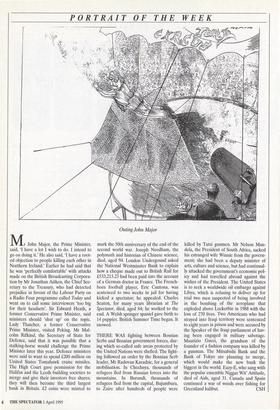PORTRAIT OF THE WEEK
Outing John Major Mr John Major, the Prime Minister, said, 'I have a lot I wish to do. I intend to go on doing it.' He also said, 'I have a root- ed objection to people killing each other in Northern Ireland.' Earlier he had said that he was 'perfectly comfortable' with attacks made on the British Broadcasting Corpora- tion by Mr Jonathan Aitken, the Chief Sec- retary to the Treasury, who had detected prejudice in favour of the Labour Party on a Radio Four programme called Today and went on to call some interviewers `too big for their headsets'. Sir Edward Heath, a former Conservative Prime Minister, said ministers should 'shut up' on the topic. Lady Thatcher, a former Conservative Prime Minister, visited Peking. Mr Mal- colm Rifkind, the Secretary of State for Defence, said that it was possible that a stalking-horse would challenge the Prime Minister later this year. Defence ministers were said to want to spend £200 million on United States Tomahawk cruise missiles. The High Court gave permission for the Halifax and the Leeds building societies to merge and give their investors free shares; they will then become the third largest bank in Britain. £2 coins were minted to mark the 50th anniversary of the end of the second world war. Joseph Needham, the polymath and historian of Chinese science, died, aged 94. London Undergound asked the National Westminster Bank to explain how a cheque made out to British Rail for £533,213.23 had been paid into the account of a German doctor in France. The French- born football player, Eric Cantona, was sentenced to two weeks in jail for having kicked a spectator; he appealed. Charles Seaton, for many years librarian at The Spectator, died, aged 84; he worked to the end. A Welsh springer spaniel gave birth to 14 puppies. British Summer Time began. It snowed.
THERE WAS fighting between Bosnian Serbs and Bosnian government forces, dur- ing which so-called safe areas protected by the United Nations were shelled. The fight- ing followed an order by the Bosnian Serb leader, Mr Radovan Karadzic, for a general mobilisation. In Chechnya, thousands of refugees fled from Russian forces into the mountains. In Burundi, thousands of refugees fled from the capital, Bujumbura, to Zaire after hundreds of people were killed by Tutsi gunmen. Mr Nelson Man- dela, the President of South Africa, sacked his estranged wife Winnie from the govern- ment; she had been a deputy minister of arts, culture and science, but had continual- ly attacked the government's economic pol- icy and had travelled abroad against the wishes of the President. The United States is to seek a worldwide oil embargo against Libya, which is refusing to deliver up for trial two men suspected of being involved in the bombing of the aeroplane that exploded above Lockerbie in 1988 with the loss of 270 lives. Two Americans who had strayed into Iraqi territory were sentenced to eight years in prison and were accused by the Speaker of the Iraqi parliament of hav- ing been engaged in military sabotage. Maurizio Gucci, the grandson of the founder of a fashion company was killed by a gunman. The Mitsubishi Bank and the Bank of Tokyo are planning to merge, which would make the new bank the biggest in the world. Eazy-E, who sang with the popular ensemble Niggaz Wit' Attitude, died of Aids, aged 31. Canada and Spain continued a war of words over fishing for


























































 Previous page
Previous page